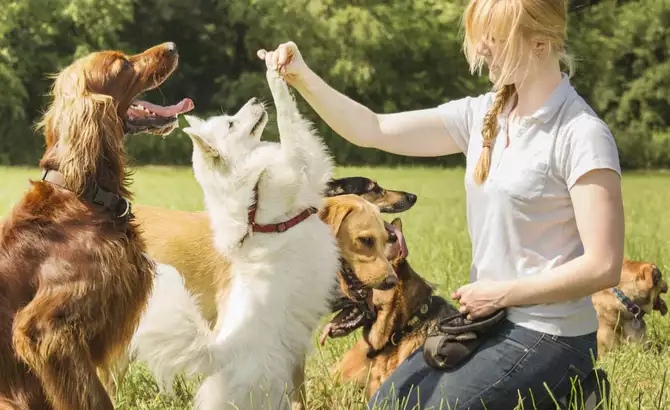Contributed by Jennifer Dew, 9 to 5 Pets
Whether you’re a new dog owner or have years of experience with canine companions, investing in a great dog trainer can make all the difference. However, it can be overwhelming trying to find the right trainer to entrust your beloved pet to in an industry that’s unregulated and when there are so many trainers to choose from.
 Getting Started
Getting Started
Word of mouth is a great way to start. Ask your friends about any training classes they’ve taken with their dogs or if they can recommend a trainer. Your veterinarian, local pet care provider, or local rescue organization can be great referral sources too.
You can also visit the websites of several professional and education organizations for dog trainers and behavior consultants and use their “find a trainer” databases to locate a reputable professional in your area. Some helpful organizations include:
Association of Professional Dog Trainers (APDT)
International Association of Canine Professionals (IACP)
Certification Council for Professional Dog Trainers (CCPDT)
 Qualifying Your Trainer
Qualifying Your Trainer
First, determine what you need from a trainer. Are you seeking basic obedience training, troubleshooting a behavioral problem, or looking for advanced training for a dog sport? There’s a difference between dog trainers and canine behavior consultants. Dog trainers specialize in training basic to advanced training cues, teaching polite manners, and training dogs for specific sport activities. Canine behavior consultants focus on treating behavioral disorders and issues like separation anxiety, phobias, aggression, fear, and resource guarding. So find out what your trainer specializes in and if they provide group classes or private training that will best meet you and your dog’s needs.
Next, ask the trainer about their methods and training philosophy, and make sure you’re comfortable with their approach. Ask them about their experience, education and any credentials they may have. Some trainers learn through apprenticeships and years of experience and others take a more academic route in building their skills. Certifications aren’t required for trainers but they can set them apart by demonstrating their commitment to their profession and interest in continuing education.
Lastly, it’s important that YOU like your trainer just as much as your dog will. So get a feel for your trainer’s personality and their people skills when you speak with them. Remember, they’ll be teaching you too (maybe even more than your dog), so you need to feel comfortable with them and how they instruct. See if you can observe one of their training classes, check out their social media pages for video posts, and ask for references from former students too.
 Enjoy The Journey
Enjoy The Journey
So often we wait for problems to crop up before we seek help. Or worse, we run away from problems or live in denial because it’s the path of least resistance. Entering into a training program with your dog is no doubt a large commitment of your time and dime. But waiting till an incident occurs to get a trainer involved can be far more damaging and costly in the long run.
If there’s one key lesson I can share, it’s to be proactive rather than reactive with your dog’s training. And I promise, the long-term benefits you’ll experience will far outweigh the short term commitment. Your dog will thrive on the mental stimulation; and they’ll love the chance to learn and practice new things. And the time you spend training your dog will improve your bond and strengthen your relationship. There’s nothing a dog love’s more than to have your undivided attention as you’re working towards a common goal. So have fun, enjoy the journey, and keep us posted on your progress!

